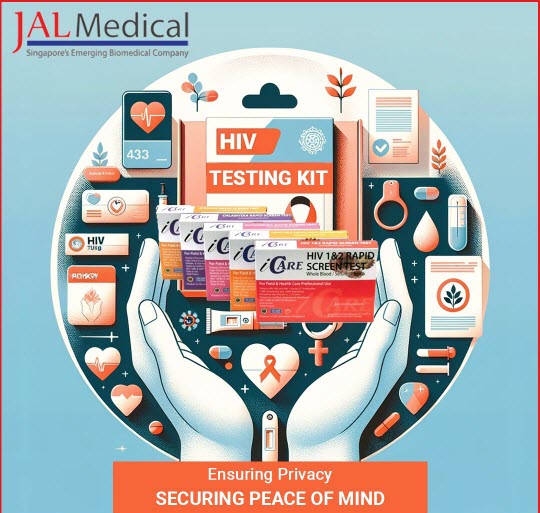Introduction
HIV remains a significant public health challenge in Africa, home to over two-thirds of the world’s HIV-positive population. Early and accurate HIV testing is crucial for managing and reducing the spread of the virus. The WHO PQ LISTED HIV 1&2 Rapid Test has become a key tool in improving early detection and ensuring accurate diagnosis across the continent. This article explores the efforts across various African countries, including Ethiopia, Egypt, DR Congo, Tanzania, South Africa, Kenya, and Uganda, to improve access to HIV Ag/Ab test kits, a critical step in the fight against HIV/AIDS.
Ethiopia
In Ethiopia, the fight against HIV is gaining momentum with increased efforts to provide HIV Ag/Ab test kits across communities. Through partnerships with international donors and local NGOs, Ethiopia is expanding its reach, ensuring that more individuals can get tested and know their status early.
Egypt
Despite a lower prevalence compared to other African countries, Egypt faces unique challenges in HIV testing, including social stigma and limited public awareness. Recent initiatives aim to improve accessibility to HIV Ag/Ab test kits through community centers and health clinics, focusing on confidentiality and counseling.
DR Congo
The Democratic Republic of Congo (DR Congo) sees a high number of HIV cases, exacerbated by ongoing conflicts and displacement. Efforts to distribute HIV Ag/Ab test kits are part of a broader strategy involving mobile clinics and community health workers, aiming to reach remote areas and vulnerable populations.
Tanzania
Tanzania is making strides in increasing access to HIV testing. By integrating HIV Ag/Ab test kit distribution into maternal and child health programs, the country is leveraging existing health infrastructure to reach more people, especially pregnant women and young mothers.
South Africa
South Africa has one of the highest HIV rates globally. The country’s comprehensive approach includes making HIV Ag/Ab test kits available in both urban and rural areas through public health facilities and community-based organizations. South Africa’s policy reforms and public campaigns are also crucial in encouraging voluntary testing.
Kenya
Kenya’s national HIV prevention strategy includes widespread distribution of HIV Ag/Ab test kits. Through community health volunteers and partnerships with schools and workplaces, Kenya is working to normalize testing and reduce stigma, a key barrier to HIV testing uptake.
Uganda
Uganda’s community-centric approach to HIV testing includes deploying village health teams equipped with HIV Ag/Ab test kits. These teams play a pivotal role in educating communities about HIV, addressing myths, and providing support for those tested positive.
Community Engagement and Education
Community engagement and education are vital in increasing the uptake of HIV testing. By involving community leaders and utilizing local media, countries are enhancing awareness and debunking myths related to HIV testing. Tools like the WHO PQ LISTED HIV 1&2 Rapid Test further support these efforts by offering reliable and accessible testing solutions.
Challenges in Accessing HIV Testing
Stigma, discrimination, and logistical challenges continue to hinder access to HIV testing in many African communities. Addressing these issues requires concerted efforts from governments, NGOs, and communities themselves.

Innovative Approaches to Improve Access
Innovations such as mobile testing units and home testing kits like the WHO PQ LISTED HIV 1&2 Rapid Test, are making HIV testing more accessible. These approaches help to reach individuals in remote areas or those reluctant to visit testing centers due to stigma.

The Impact of Increased Testing Access
Increased access to HIV testing has profound impacts, including earlier detection and treatment initiation, which can significantly improve life expectancy and reduce the transmission of the virus to others.
Future Directions
The future of HIV testing in Africa includes potential advancements in test technology, greater international support, and continued emphasis on community involvement and education.
Conclusion
Enhancing access to HIV Ag/Ab test kits across African communities is crucial in the ongoing fight against HIV/AIDS. Through innovative strategies, community engagement, and international support, significant progress can be made toward controlling and eventually ending this epidemic. The availability of the WHO PQ LISTED HIV 1&2 Rapid Test plays a vital role in ensuring accurate and accessible testing for communities in need.
FAQs About HIV Ag/Ab Test Kits
Why is access to HIV Ag/Ab test kits important?
Access to HIV Ag/Ab test kits is vital for early detection and management of HIV, helping to reduce the spread of the virus and improve individuals’ health outcomes.
What challenges do African countries face in increasing HIV testing access?
African countries face several challenges, including stigma, discrimination, logistical issues, and funding constraints.
How are communities involved in promoting HIV testing?
Communities play a crucial role through education, advocacy, and by hosting testing campaigns, often in collaboration with health organizations.
What innovative approaches are being used to increase testing access?
Mobile testing units, home testing kits, and integrating testing into existing health programs are innovative ways to increase access.
What is the future direction for HIV testing in Africa?
The future involves advancing testing technologies, increasing international support, and continuing to engage communities in the testing process.

